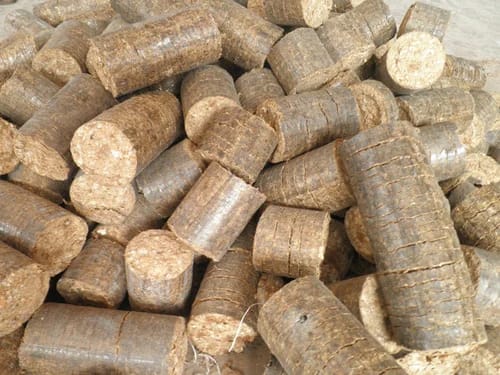Organic materials, like agricultural residues, forestry waste, and biomass feedstock, produce biomass briquette, which serves as compacted fuel blocks used in industries and households. They offer several advantages over traditional fossil fuels and contribute to sustainable energy practices. Visit: Biomass Briquette Machine
Here are some key aspects and benefits of biomass briquettes:
Raw Materials
Biomass briquettes are primarily made from agricultural residues like rice husk, straw, corn stalks, sugarcane bagasse, and forestry waste such as sawdust, wood chips, and bark. These materials are abundant and readily available, making biomass briquettes a sustainable and environmentally friendly fuel option. Explore: Biomass Briquetting Machines
Energy Efficiency
Biomass briquettes have high energy content and can efficiently generate heat when burned. They have a low moisture content, which leads to efficient combustion and minimal energy loss. As a result, biomass briquettes offer a cost-effective alternative to traditional fossil fuels like coal or wood.
Carbon Neutrality
Burning biomass briquettes releases carbon dioxide (CO2), but the raw materials used to make them absorb CO2 during their growth phase, making the overall carbon emissions considered neutral. This makes biomass briquettes a carbon-neutral fuel source, contributing to the reduction of greenhouse gas emissions and combating climate change.
Waste Management
Biomass briquettes utilize agricultural and forestry waste materials that would otherwise be discarded or burned inefficiently. By converting these waste materials into valuable energy resources, biomass briquettes help in waste management, reducing the environmental impact of waste disposal.
Versatile Applications
Various industries, including power plants, brick kilns, boiler systems, and household heating, can use biomass briquettes. They are suitable for both industrial and domestic applications, providing a renewable and sustainable fuel option.
Easy Storage and Handling
Biomass briquettes are compact and have a uniform shape, making them easy to store, transport, and handle. Their standardized size and density enable efficient combustion and reduce handling and logistics costs.
Reduced Air Pollution
Biomass briquettes have lower emissions of pollutants, such as sulphur dioxide (SO2) and nitrogen oxides (NOx), compared to traditional fossil fuels. The combustion of biomass briquettes produces less smoke, particulate matter, and harmful gases, resulting in improved air quality and reduced health risks.
In summary, A biomass briquette is a sustainable and renewable energy source that utilizes organic waste materials. They offer energy efficiency, carbon neutrality, waste management benefits, and versatile applications in various industries. By promoting the use of biomass briquettes, we can reduce reliance on fossil fuels, mitigate environmental impact, and contribute to a cleaner and greener future.
Read About: Overview of Shearing Machine
